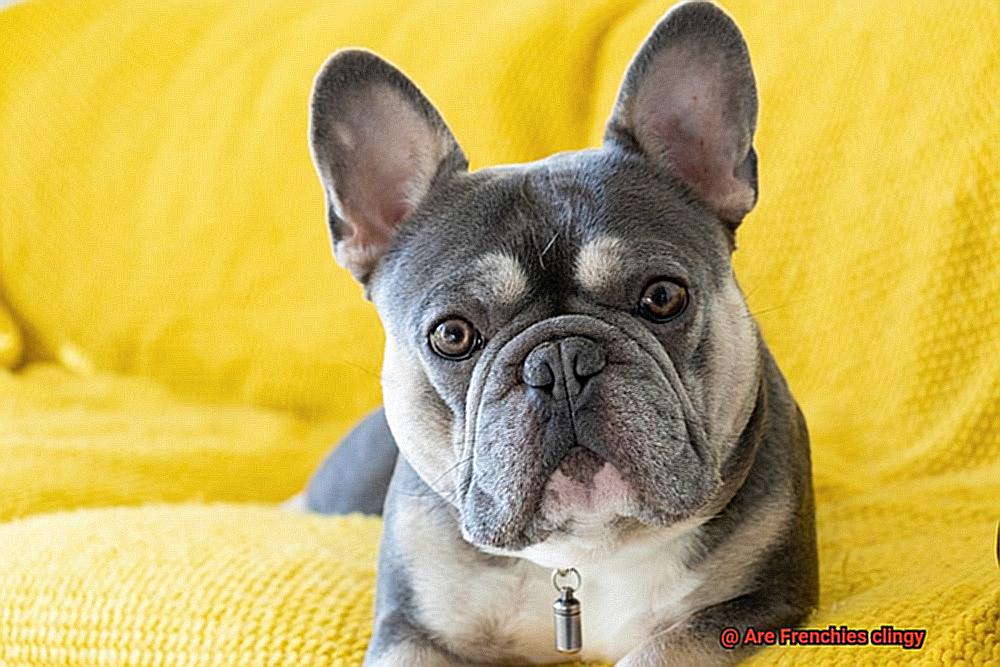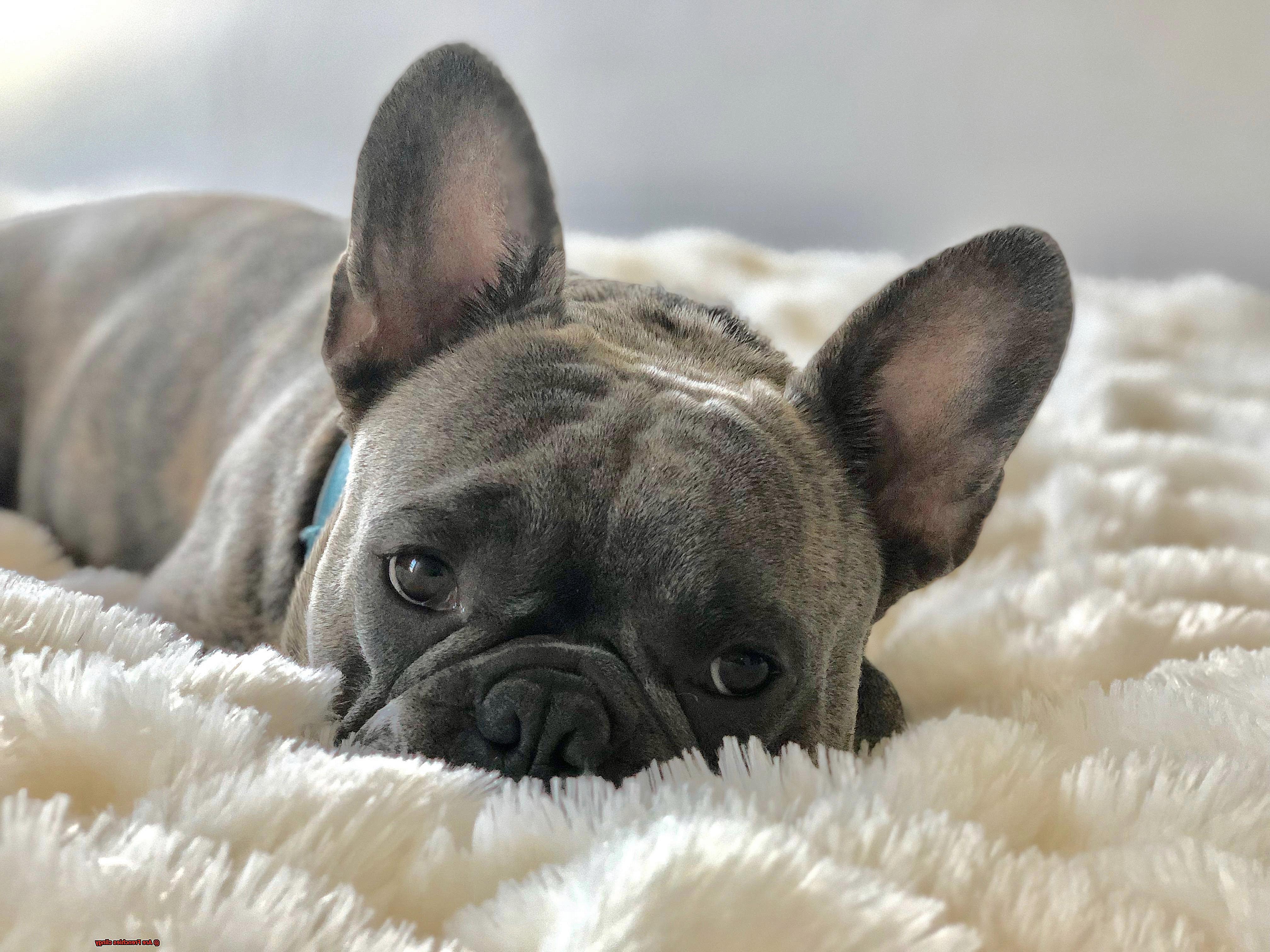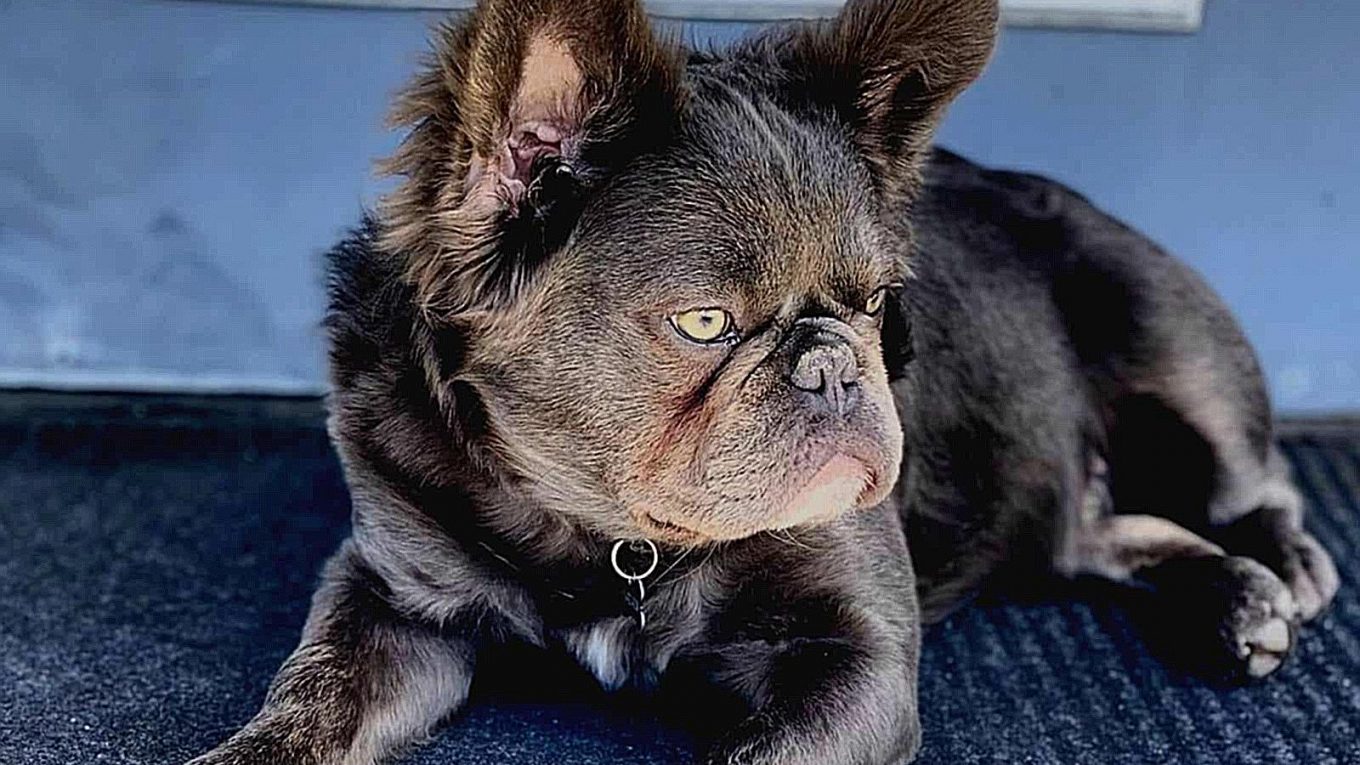Are Frenchies clingy?
Craving a constant companion who showers you with endless love and affection? Look no further than the delightful world of French Bulldogs, those lovable velcro dogs renowned for their clinginess. These small yet mighty canines have captured hearts worldwide with their unwavering devotion and affectionate nature.
French Bulldogs, or “Frenchies” as they’re affectionately called, possess a unique blend of characteristics that make them stand out from other breeds. Their clinginess isn’t just apparent; it’s deeply ingrained within their personality, creating an unbreakable bond with their human companions.
Picture a Frenchie wagging its adorable stubby tail, relentlessly seeking attention and cuddles. With expressive eyes, plush coats, and enchanting “bat-like” ears, French Bulldogs possess an irresistible allure that reinforces their natural ability to forge deep connections with humans.
Unlike more independent breeds, Frenchies thrive on human interaction and are notorious for constantly seeking companionship. They’re incredibly affectionate creatures who relish in physical contact – whether it’s snuggling up on the couch, plopping themselves onto your lap, or eagerly following you from room to room.
But what sets French Bulldogs apart is their uncanny ability to read and mirror their owner’s emotions. They’re masters at sensing when you need extra support or a shoulder to lean on, offering unwavering loyalty and comfort during challenging times.
Clinginess in French Bulldogs extends beyond mere affectionate behavior; it manifests in their undying devotion to their human family. They become not just pets but integral parts of the household, tirelessly ensuring everyone’s wellbeing and happiness.

Throughout this captivating journey, we’ll delve deeper into the clinginess that defines French Bulldogs. We’ll explore the behaviors and traits that make them such loyal and doting companions while unveiling the scientific and social factors that contribute to their velcro-like tendencies. So, buckle up and get ready to discover why Frenchies are the epitome of clinginess in the dog kingdom.
Stay tuned for upcoming articles where we’ll explore the incredible bond French Bulldogs forge with their human families, uncover training tips to manage their clinginess, and discuss the importance of striking the right balance to ensure their well-being.
Are you ready to discover why Frenchies make the best clingy companions? Let’s dive in.
The History of French Bulldogs
Contents
- 1 The History of French Bulldogs
- 2 Frenchies Need Human Interaction
- 3 Signs of Excessive Clinginess in Frenchies
- 4 Setting Boundaries for Your Frenchie
- 5 How to Manage Separation Anxiety in French Bulldogs
- 6 Training Techniques to Help Your Frenchie Adjust
- 7 Professional Advice for Severe Cases of Clinginess
- 8 Striking a Balance Between Attention and Independence
- 9 Conclusion
In this blog post, we will delve into the fascinating history of French Bulldogs and explore how their breeding and upbringing contribute to their clingy behavior. So buckle up, Frenchie enthusiasts, as we embark on a journey through time to uncover the truth behind your loyal companion’s clinginess.
From Lace Workers to Lapdogs: The Origin Story
- French Bulldogs originated in England in the 1800s as companions for lace workers in Nottingham.
- These workers migrated to France during the Industrial Revolution, bringing their beloved Bulldogs with them.
- In France, these dogs gained immense popularity, and that’s where they acquired their distinctive name.

Breeding Evolution: Smaller Size and Friendlier Disposition
- Initially, French Bulldogs were larger and possessed a more aggressive temperament due to crossbreeding with various terrier breeds.
- Over time, breeders focused on creating a smaller size and a more amiable disposition.
- Selective breeding led to the development of the French Bulldog we know today, characterized by their compact size, bat ears, and friendly nature.

The Clingy Connection: Understanding Clinginess in French Bulldogs
- Due to their history as companion dogs, French Bulldogs naturally form strong bonds with their owners.
- They thrive on human companionship and may exhibit clingy behavior as a result.
- However, it’s important to note that clinginess can vary from dog to dog based on factors such as socialization, training, and individual personality traits.
Strategies for Managing Clinginess in French Bulldogs
- Provide appropriate training and socialization from an early age to ensure a well-adjusted and happy Frenchie.
- Engage in regular playtime, walks, and stimulating activities to satisfy their need for attention and companionship.
- Set boundaries and teach independence to prevent excessive clinginess.
- Seek professional advice if your Frenchie’s clinginess becomes excessive or leads to separation anxiety.
Frenchies Need Human Interaction
French Bulldogs, with their affectionate and friendly nature, are naturally inclined towards seeking human interaction. These adorable pups thrive on companionship and can become quite attached to their owners or family members.

So, if you have a Frenchie in your life, it’s important to understand their needs and provide them with the love and attention they crave.
Clingy Behavior
One of the most common characteristics of French Bulldogs is their clingy behavior. They are known to constantly seek attention and want to be in close proximity to their humans. You may find them following you around the house, sitting close to you, or even trying to climb onto your lap whenever possible. This clinginess can be attributed to the breed’s history as companion dogs, bred specifically to provide companionship to humans.
Separation Anxiety
French Bulldogs are not independent dogs and may suffer from separation anxiety if left alone for extended periods of time. Lack of human interaction can lead to feelings of loneliness and distress in these lovable pups, which can manifest in various behavioral problems such as excessive barking or destructive chewing. It is crucial to address their need for human interaction to prevent these issues from arising.
Fulfilling their Needs
Regular interaction and engagement with their owners are essential for the overall well-being and happiness of French Bulldogs. Spending quality time with them through activities like playtime, walks, or training sessions helps fulfill their need for human interaction. These interactions not only provide them with physical exercise but also strengthen the bond between you and your furry friend.
Mental Stimulation
In addition to physical activity, providing mental stimulation is also important for French Bulldogs. Boredom can lead to destructive behavior, so it’s essential to keep their minds occupied. Toys or puzzle games can be great tools to alleviate any boredom or restlessness that may arise from a lack of human attention.
Signs of Excessive Clinginess in Frenchies
It’s important to recognize the signs of excessive clinginess in Frenchies to address any potential behavioral issues. In this blog post, we will explore the signs of excessive clinginess in French Bulldogs and provide helpful information on how to recognize these signs.
Constant Following:
If your Frenchie is constantly following you from room to room and not giving you any personal space, it may indicate excessive clinginess. While it’s normal for dogs to want to be with their owners, excessive following can become problematic if it leads to separation anxiety or dependency.
Excessive Attention-Seeking Behavior:
Is your Frenchie constantly pawing, barking, or jumping on you for attention? While seeking attention is natural, excessive attention-seeking behavior can become overwhelming and disruptive. It may indicate that your Frenchie is relying too heavily on your presence for emotional well-being.
Separation Anxiety:
Separation anxiety is a common issue in clingy French Bulldogs. Signs of separation anxiety may include destructive behavior, excessive barking or howling, house soiling, or attempts to escape when left alone. If your Frenchie displays these behaviors, it may indicate excessive clinginess and difficulty coping with being apart from you.
Possessive Behavior:
Clingy French Bulldogs may exhibit possessive behavior towards their owners. They may become overly protective or territorial, guarding their owners from other people or animals. This possessiveness can lead to aggression or anxiety if not properly addressed.
Increased Need for Physical Contact:
If your Frenchie constantly demands to be held, cuddled, or touched, it may indicate excessive clinginess. While it’s important to provide affection and physical contact to your Frenchie, an excessive need for it may indicate clinginess.
Setting Boundaries for Your Frenchie
French Bulldogs are known for their affectionate nature and love for their owners. However, their clinginess can sometimes become overwhelming if not managed properly. That’s why setting boundaries for your Frenchie is crucial to ensure a healthy and balanced relationship. By establishing clear guidelines and expectations, you can create a sense of structure that both you and your dog can feel comfortable and secure in.
Consistent Training: Building a Foundation
One way to set boundaries is through consistent training. Teaching your Frenchie basic commands such as “sit,” “stay,” and “down” can help establish your role as the leader and create a sense of structure.
This will help your Frenchie understand what is expected of them and prevent them from becoming overly dependent on you. Training sessions should be short, frequent, and rewarding to keep your Frenchie engaged and motivated.
Establishing a Routine: A Foundation for Security
Another important aspect of setting boundaries is establishing a routine. Dogs thrive on routine and structure, so having set times for feeding, exercise, playtime, and rest will help your Frenchie feel more secure and less needy. It also helps them understand when it’s appropriate to seek attention and when they need to entertain themselves. Stick to the routine as much as possible, but also be flexible enough to accommodate changes when necessary.
Avoid Reinforcing Clingy Behavior: Balancing Love and Independence
It’s natural to want to shower your Frenchie with love and attention, but constantly giving in to their demands can reinforce their clinginess. Instead, reward them for independent behavior such as playing with toys on their own or settling down quietly. Gradually increase the time you spend apart from each other, encouraging them to learn that it’s okay to be alone and that they don’t need constant attention from you.
Mental Stimulation: Keeping Their Minds Busy
Providing mental stimulation is crucial in setting boundaries for your Frenchie. Engage them in puzzle toys, interactive games, or training sessions that challenge their minds and keep them occupied. This not only helps prevent boredom-related clinginess but also promotes their overall well-being. A tired mind is a content mind.
Be Mindful of Your Behavior: Consistency is Key
Lastly, be mindful of your own behavior. If you constantly give in to your Frenchie’s demands or exhibit inconsistent rules, they may become confused and clingier as a result. Stay firm, consistent, and patient in your approach, and remember that setting boundaries is a process that takes time and effort.
How to Manage Separation Anxiety in French Bulldogs
French Bulldogs are known for their affectionate and clingy nature. While this can be endearing, it can also lead to separation anxiety when they are left alone. If you own a Frenchie and want to learn how to manage their separation anxiety, you’ve come to the right place. In this article, we will explore some effective strategies to help your furry friend feel more secure and relaxed when you’re not around.
Gradual Desensitization:
Start by leaving your Frenchie alone for short periods of time and gradually increase the duration. This helps them become more comfortable with being alone. Remember to keep departures and arrivals low-key to avoid reinforcing their anxiety.
Create a Safe Space:
Provide your Frenchie with a cozy crate or a designated area that contains their bedding, toys, and familiar smells. This will give them a sense of security and prevent destructive behaviors due to anxiety.
Establish a Consistent Routine:
Dogs thrive on predictability, so having set times for meals, walks, and playtime can help reduce separation anxiety. Incorporating mental stimulation activities like puzzle toys can also keep them occupied and distract them from feeling anxious.
Practice Calm Departures and Arrivals:
Avoid making a big fuss when leaving or coming back home. Gradually increase the time spent away and maintain a calm demeanor to help your Frenchie understand that your departures are temporary and nothing to be worried about.

Seek Professional Help if Needed:
In severe cases, professional help may be necessary. A certified dog trainer or behaviorist can develop a personalized training plan specific to your Frenchie’s needs. They may recommend techniques like counter-conditioning and desensitization exercises to help your dog overcome their fear of being alone.
Training Techniques to Help Your Frenchie Adjust
French Bulldogs are known for their affectionate and clingy nature, which can sometimes pose challenges in training and adjusting to new environments. However, with the right training techniques and consistent effort, owners can help their Frenchies become more independent and adaptable.
Socialization:
Socializing your Frenchie from a young age is crucial for helping them adjust to new environments. Exposing them to various people, animals, and environments helps them become more comfortable and confident in different situations, reducing clinginess. Take your Frenchie to dog parks, puppy classes, or arrange playdates with other well-behaved dogs to ensure proper socialization.
Crate Training:
Crate training can be a valuable tool in helping your Frenchie adjust and feel secure in their own space. Crates serve as a safe haven for your Frenchie when they need some alone time or when you’re away from home. To crate train your Frenchie, gradually introduce them to the crate using positive reinforcement. Start by leaving the crate door open with treats inside and gradually increase the duration of time they spend in the crate.
Independence Training:
Teaching your Frenchie to be independent and self-reliant is important for reducing clinginess. Gradually increase their alone time and encourage them to engage in activities on their own. Leave them with puzzle toys or interactive feeders and gradually increase the duration of alone time. Reward calm behavior with treats or praise.
Positive Reinforcement:
Using positive reinforcement techniques during training sessions is essential for helping your Frenchie adjust. Reward desired behaviors with treats, praise, or playtime to help them associate positive experiences with independence and adaptability. Timing the rewards correctly and using high-value treats can enhance the effectiveness of positive reinforcement.

Consistency and Patience:
Consistency is key when training your Frenchie to adjust and become less clingy. Stick to the training techniques you choose and be patient. It takes time for dogs to learn new behaviors and habits, so consistency in training is crucial. Don’t get discouraged if progress is slow, as every Frenchie is unique and may require different amounts of time to adjust.
Professional Advice for Severe Cases of Clinginess
Understanding the root cause
In order to effectively manage severe cases of clinginess in your French Bulldog, it is crucial to understand the underlying reasons behind their behavior. Clinginess can be a result of separation anxiety, lack of confidence, or even a constant need for attention and reassurance. By identifying the root cause, you will be better equipped to address and manage this issue.
Gradual desensitization
If your Frenchie exhibits extreme clinginess, a gradual desensitization process can be highly beneficial. Start by leaving them alone for short periods of time and gradually increase the duration over time. This allows your dog to build confidence and realize that being alone is not something to be afraid of.
Establish a routine
Dogs thrive on routine, and clingy French Bulldogs are no exception. Establishing a consistent daily schedule that includes regular feeding times, exercise sessions, and designated alone time can provide them with a sense of security and reduce clinginess. Creating a routine helps them feel more secure and less reliant on constant attention.
Provide mental and physical stimulation
Engaging your Frenchie in activities that stimulate both their mind and body can work wonders in alleviating clinginess. Make sure they receive plenty of exercise through daily walks or play sessions. Additionally, providing interactive toys or puzzles can keep their minds occupied when you are not available. This mental stimulation is key in diverting their focus from constant reliance on you.

Gradual introductions to new environments
If your Frenchie becomes overly attached when in unfamiliar surroundings, it is important to introduce them gradually to new environments. Start by taking them to quieter places with minimal distractions and gradually expose them to more stimulating environments. This gradual approach can build their confidence and reduce clingy behavior.
Seek professional help if needed
In severe cases where the above strategies do not seem to be effective, seeking professional help from a dog trainer or behaviorist can be beneficial. They can assess your Frenchie’s behavior, provide tailored advice, and develop a training plan specific to your dog’s needs. Remember, professional guidance can make all the difference in overcoming severe cases of clinginess.
Striking a Balance Between Attention and Independence
While giving them attention is important, it is equally crucial to teach them independence. In this blog post, we will explore the importance of striking a balance between attention and independence for French Bulldogs.

The Need for Attention
- Frenchies thrive on human interaction and enjoy being part of family activities.
- Provide regular playtime, walks, cuddles, and engaging activities to fulfill their need for attention.
- Socialize them with other dogs and people to prevent anxiety or loneliness when left alone.

Teaching Independence
- French bulldogs can become overly dependent if not given the opportunity to develop their own sense of self.
- Gradually increase the time your Frenchie spends alone to encourage independence.
- Use interactive toys or treat puzzles to keep them entertained and mentally stimulated during your absence.
Crate Training
- Crate training can be beneficial in teaching your Frenchie independence.
- Introduce the crate positively as a safe space for your Frenchie.
- It helps prevent destructive behavior when you are away and provides a sense of security.
Establishing Boundaries
- Avoid overindulging clingy behavior and set aside designated “alone time.”
- Encourage your Frenchie to learn to entertain themselves without relying solely on your presence.
- Gradually reduce their reliance on constant attention.
ePdgri4-v8c” >
Conclusion
French Bulldogs, often referred to as Frenchies, are known for their affectionate and loving nature. They have a reputation for being clingy, but is this really the case? Well, let’s take a closer look.
These adorable little dogs thrive on human companionship and crave attention. They will follow you around the house, always wanting to be by your side. Whether you’re watching TV or working on your laptop, they’ll be right there, snuggled up next to you.
Their loyalty knows no bounds. Frenchies form strong bonds with their owners and become deeply attached to them. They will shower you with kisses and demand cuddles whenever they can.
But don’t mistake their clinginess for neediness. Frenchies are independent thinkers and have a stubborn streak. They may want to be near you all the time, but they also appreciate having some alone time to relax and recharge.
Their clinginess is not just limited to their owners; it extends to other family members as well. French Bulldogs are great with children and get along well with other pets too. They will happily join in on family activities and make sure everyone feels loved.
So, yes, Frenchies can be clingy, but it’s all part of their endearing charm. Their affectionate nature brings joy and warmth to any household they become a part of.
In conclusion, if you’re looking for a furry friend who will stick by your side through thick and thin, then a French Bulldog might just be the perfect companion for you.




